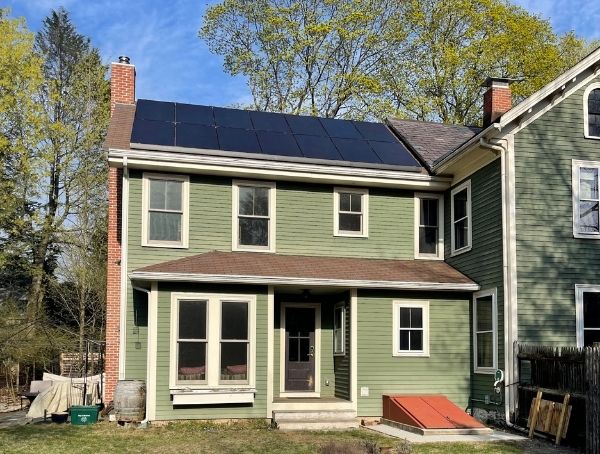Residential Solar Incentives in Massachusetts
Solar Incentives & Cost-Saving Options for Homeowners
Going solar in Massachusetts is about more than clean energy; it's about controlling your energy costs in a market where utility rates continue to rise year after year. While some federal incentives that were previously available are no longer offered, homeowners still have access to strong state programs and flexible solar options that make switching to solar both practical and affordable.
At Future Energy Solar, we focus on what works today. We help homeowners understand current incentives, compare solar options, and choose the path that delivers long-term savings and predictable energy costs
At Future Energy Solar, we focus on what works today. We help homeowners understand current incentives, compare solar options, and choose the path that delivers long-term savings and predictable energy costs

Federal Solar Incentives – What’s Changed
In previous years, homeowners could take advantage of a federal solar tax credit that helped reduce the upfront cost of purchasing a solar system. As of this year, that federal incentive is no longer available.
While this change affects traditional solar ownership, it has also shifted the focus toward solutions that do not rely on tax credits, especially Solar Power Purchase Agreements (PPAs). These options allow homeowners to go solar with no upfront cost while still benefiting from long-term savings and energy rate stability.
While this change affects traditional solar ownership, it has also shifted the focus toward solutions that do not rely on tax credits, especially Solar Power Purchase Agreements (PPAs). These options allow homeowners to go solar with no upfront cost while still benefiting from long-term savings and energy rate stability.
Solar Options That Don’t Rely on Tax Credits
Solar Power Purchase Agreements (PPAs)
A Solar Power Purchase Agreement (PPA) allows you to go solar with $0 down and without purchasing the system. Our expert team installs the system, a third party owns and maintains the panels on your home, and you enjoy clean solar energy at a locked-in rate for the next 25 years.
While utility rates can, and often do, increase over time, a PPA gives you predictable energy costs and long-term protection from rising prices.
Key benefits of a solar PPA include:
While utility rates can, and often do, increase over time, a PPA gives you predictable energy costs and long-term protection from rising prices.
Key benefits of a solar PPA include:
For homeowners focused on budget stability, long-term savings, and simplicity, PPAs are one of the most popular solar options in Massachusetts today.
At Future Energy Solar, we’ll compare your current utility rates to a fixed PPA rate so you can clearly see how solar helps control your energy costs over time.
Contact UsAt Future Energy Solar, we’ll compare your current utility rates to a fixed PPA rate so you can clearly see how solar helps control your energy costs over time.


Massachusetts State Solar Incentives & Exemptions
Massachusetts continues to offer valuable state-level solar incentives, which may apply depending on the type of solar option you choose.
Massachusetts State Solar Tax Credit (Ownership Only)
Homeowners who purchase a solar energy system may qualify for a Massachusetts state income tax credit worth 15% of the system cost, up to $1,000, subject to eligibility requirements.
Additional Massachusetts Benefits
Additional Massachusetts Benefits
Eligibility varies based on system ownership and utility provider. Our team will explain which incentives apply to your situation and assist with required documentation where applicable.
We recommend consulting with a licensed tax professional to confirm eligibility.
Contact UsWe recommend consulting with a licensed tax professional to confirm eligibility.
Net Metering in Massachusetts
Net metering allows solar customers to receive bill credits for excess electricity sent back to the grid. These credits can roll over month to month and help offset future energy usage when your system produces less power.
Savings depend on system size, energy usage, and utility provider. Net metering remains one of the most valuable state-level benefits of going solar in Massachusetts.
Savings depend on system size, energy usage, and utility provider. Net metering remains one of the most valuable state-level benefits of going solar in Massachusetts.
Renewable Energy Credits (RECs)
Homeowner-owned solar systems may generate Renewable Energy Credits (RECs) based on the amount of electricity produced. These credits can be sold to utilities that must meet renewable energy requirements.
REC eligibility depends on system ownership and program registration. Future Energy Solar assists with certification and enrollment when applicable.
Contact UsREC eligibility depends on system ownership and program registration. Future Energy Solar assists with certification and enrollment when applicable.

SMART 3.0, ConnectedSolutions & MLP Programs (Availability Varies)
01
SMART 3.0 Program
02
ConnectedSolutions Program
03
Municipal Light Plant (MLP) Solar Rebates
Why Solar Still Makes Sense in Massachusetts
Even without federal tax credits, solar remains a strong financial option for Massachusetts homeowners. With $0-down PPAs, locked-in energy rates, net metering, and state-level benefits, many homeowners are choosing solar as a way to protect themselves from rising utility costs.
At Future Energy Solar, we don’t rely on outdated incentives. We focus on long-term value, cost control, and transparency, so you know exactly what to expect before making a decision.
Talk to a Solar AdvisorAt Future Energy Solar, we don’t rely on outdated incentives. We focus on long-term value, cost control, and transparency, so you know exactly what to expect before making a decision.




